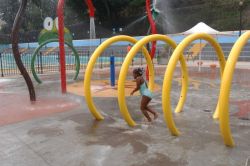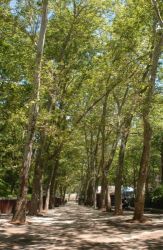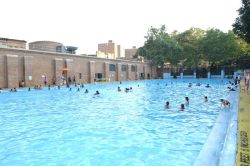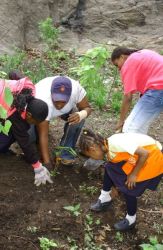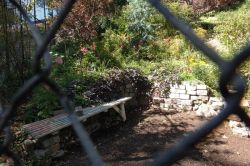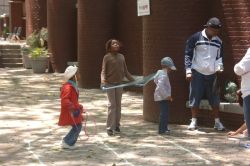Jackie Robinson Park
Jackie Robinson Park
What was here before?
This area of Manhattan was inhabited by the Lenape before it was colonized by the Dutch and named New Haarlem in 1660 and in 1664 renamed New York by the English. During the Revolutionary War, this was the site of the Battle of Harlem Heights where George Washington won the battle and eventually the war.
After the war, the already sparse population declined further as people moved to a more developed downtown. For this reason, the grid plan was abandoned above 155th Street where many of the farms and homesteads were. The 1811 Commissioner’s Plan deemed it "improbable that (for centuries to come) the grounds north of the Harlem Flat will be covered with houses."
How did this site become a park?
This park was acquired by the City of New York between 1894 and 1899 and opened in 1911 as Colonial Park, connecting to the site’s history. In the 1930s, NYC Parks utilized the resources of the Works Progress Administration to further improve the park. NYC Parks architect Aymar Embury II designed an additional playground, basketball and volleyball courts, roller skating areas, wading pool and a bandshell which hosts concerts throughout the warm season.
The park was renamed for Jackie Robinson in 1978 by local law and a bronze bust of Robinson by Inge Hardison was installed inside the Jackie Robinson Pool and Recreation Center entryway at West 147th Street and Bradhurst Avenue in 1981. These facilities were designated a New York City historical landmark structure in 2007.
In 2020, a large-scale redesign and renovation along Edgecombe Avenue and on 145th Street was completed through the Parks Without Borders capital construction initiative to make parks more accessible and welcoming to everyone while improving neighborhoods by extending the beauty of parks out into communities and creating vibrant public spaces by transforming underused areas. The park redesign reduced fence heights and restored a pathway that connects a reopened entrance to an updated plaza.
Who is this park named for?
Jackie Robinson (1919-1972) is legendary for his pioneering role as the first Black professional baseball player in the major leagues. Born in Cairo, Georgia and raised in Pasadena, California, Robinson’s success was foretold at the University of California at Los Angeles, where he became the first student to earn letters in four sports: baseball, basketball, football and track. He played football for the Los Angeles Bulldogs, before serving in the army during World War II. After the war, Robinson played baseball in the Negro Leagues for the Kansas City Monarchs. Brooklyn Dodgers general manager, Brandon Rickey signed him to the Dodger’s top farm team, the Montreal Royals, in 1945.
On April 15, 1947, Robinson made history as the first African American to play in a major league baseball game and paved the way for generations of black athletes to compete in America’s national pastime. Robinson led the Dodgers, as a second baseman, to six World Series appearances. He retired in January 1957 with a lifetime batting average of .311. He was inducted into the National Baseball Hall of Fame in 1962.
Robinson became involved with the Chock Full O’ Nuts restaurant chain as well as a number of black-owned community enterprises such as Freedom National Bank (which he co-founded) and a land development firm. He was also active in the National Association for the Advancement of Colored People (NAACP) and civil rights. Robinson died at his home in Stamford, Connecticut in 1972.
Check out your park's Vital Signs
Clean & Safe
Green & Resilient
Empowered & Engaged Users
Share your feedback or learn more about how this park is part of a
Vital Park System




